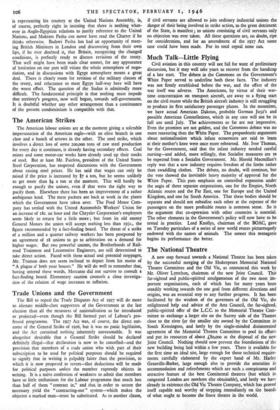The American Strikes
The American labour unions are at the moment giving a tolerable impersonation of the American eagle—with an olive branch in one claw and a bunch of arrows in the other. The steel strike, which involves a direct loss of some 200,000 tons of raw steel production for every day it continues, is already having secondary effects. Coal mines and some motor-car works have already used up their stocks of steel. But at least Mr. Fairless, president of the United States Steel Corporation, has reopened discussions with the Government about raising steel prices. He has said that wages can only be raised if the price is increased by $7 a ton, but he seems unlikely to get more than $4 a ton at the moment. This will hardly be enough to pacify the unions, even if that were the right way to pacify them. Elsewhere there has been an improvement of a rather ambiguous kind. The meat packers are back at work in the plants which the Government have taken over. The Ford Motor Com- pany has settled with the United Automobile Workers' Union for an increase of 18c. an hour and the Chrysler Corporation's employees seem likely to return for a little more ; but from its old enemy General Motors the union will accept nothing less than rgc., the figure recommended by a fact-finding board. The threat of a strike of a million and a quarter railway workers has been postponed by an agreement of 18 unions to go to arbitration on a demand for higher wages. But two powerful unions, the Brotherhoods of Rail- road Trainmen and Locomotive Engineers, are still determined to take direct action. Faced with these actual and potential stoppages, Mr. Truman does not seem inclined to depart from his motto of " A plague o' both your houses." He will do well to remember that, having uttered these words, Mercutio did not survive to consult a fact-finding board. Elementary caution counsels a close investiga- tion of the relation of wage increases to inflation.


























 Previous page
Previous page